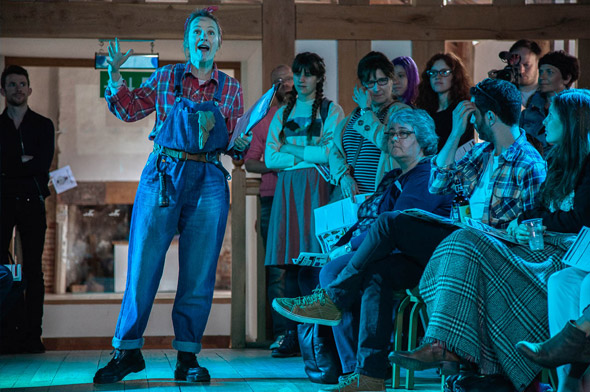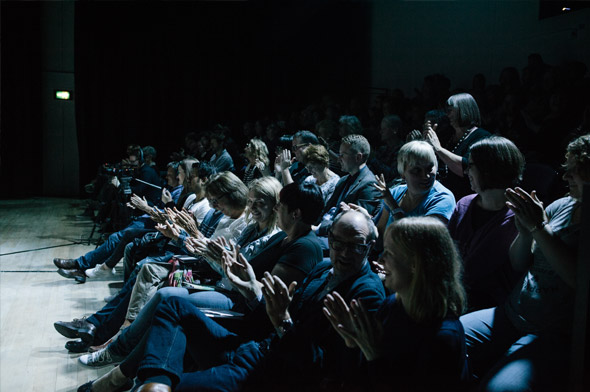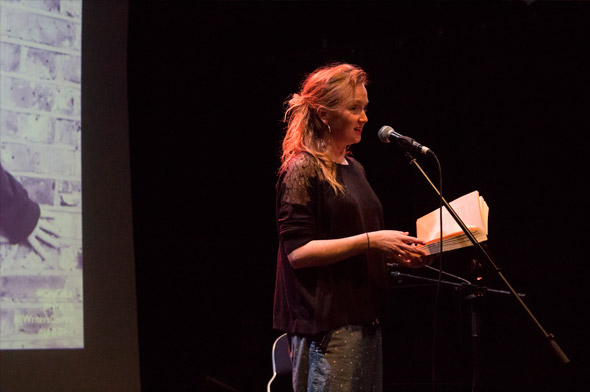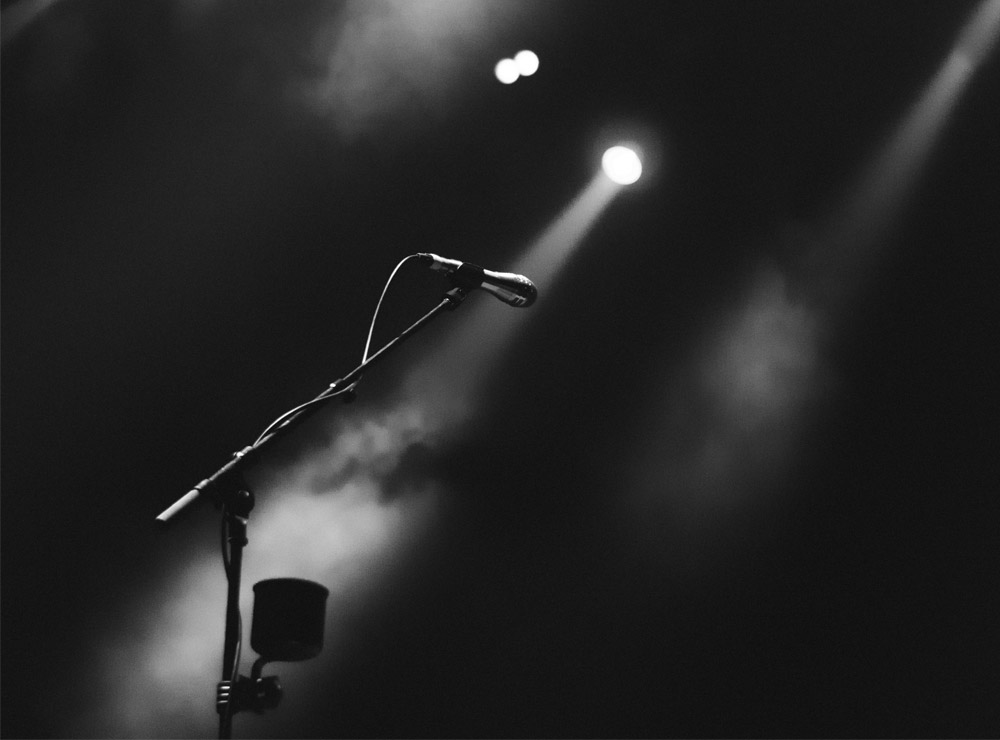This website is the public face of the International Literature Showcase. There’s another conversation taking place on Slack, in a growing community of more than 180 programmers, producers, publishers, writers, teachers, and other literature professionals from around the world.
If you’re a literature professional, this is the place to be to uncover deeper debate and form exciting new creative collaborations.
The Literature, Live theme in October surfaced three main debates. Below we’ve curated some of the most insightful contributions…
1. Can a literature event ever recreate the deep imaginative immersion of reading? Does it need to? What is the relationship between events as one-off moments in time, and our urge to document and reproduce? What do we want the art of literature, live, to do and be?
‘No thing in all of the arts has evolved less than the reading at literature events. It is almost uniformly in the same mode, with the same structure. A reader at the front, normally one to three speakers, an audience seated. An hour in length. Excerpts from a pre-existing work, read from the page. But there's very little dialogue about what the reading actually is - a simulacra of the written text, shadow of the book that others can read in their spare time. Once this is acknowledged then the reading becomes a space for play against / with that, for experiments in immersion that explore how we actually hear language, what we can actually listen to and what affects all this in live space.’
‘I want an experience with art when I go to an event. I'm increasingly frustrated with events that create a space and then don't fill it with much worth experiencing: a writer talking about their childhood isn’t literature. I want to step into literature in the way of theatre, I want to be presented with a vibrant experience that I couldn't have on my own with the book (or album etc).’

‘A call for innovation in how we think about literary events delivery, commissions and performance is important. It’s a developing field as producers in this area gain confidence and resources and as audiences for literature grow and develop. Performance projects are different in concept and delivery to an author talking about their work. We’re pitching apples against pears. My view is that festivals of literature and books should be broader - there is room for everything that audiences love whether that be a newly commissioned performance piece, an audio installation that uses words in context or a brilliant author talking in depth about their work. The innovation is there in the smaller rather than the larger festivals I think and therefore perhaps not always visible to all of us that are interested in this area.’
‘What I'm looking for (to torture the metaphor) is a nice mixed fruit salad. We get nothing but apples, apples and more apples at present. Why force the presentation of a novel to have a reading when that mode that is frequently ineffective?’
‘Producers can help too. If you bill an event as 'an evening with x writer' then the writer is in the spotlight and the event really does stand or fall by their comfort on stage. They are the headline, they are the act. Not the words they toiled over to compose, but them as personality. That's inherently scary and outside the central skill set of the writer.’
‘I don’t think an event is ever able to offer the same immersion as reading, because of the physical context. But it is social, this is a huge element of it, community, people don't acknowledge this enough.’
‘This also reflects discussions about live vs reproduced performance. Recordings can provide a conduit for outstanding productions to reach wider than an event ever could. New modes of events need to be seen, shared and widely understood for change to reach critical mass. In my experience, documenting and reproducing – whether through NT Live, MET Opera Live, or broadcasts of events - has encouraged audiences to explore live performance and begin to attend other sorts of events.’
‘This is a conversation that performance art has been having for a while: whether documentation is a good thing or a bad thing. Whether the ephemerality is the point of performance or if documentation also serves a purpose to the work.'
‘This discussion is as old as the medium and still interesting: how documentation happens and what one does with it. It's a currency, a lesser thing than the performance / event / reading, but still enormously important. Without it things disappear.’
‘There are interesting examples of some of this in interactive forms, too. Computer games that only let you play them once or that have player failure be permanent in some way. It’s all an attempt to add an element of ephemerality to something which is inherently very repeatable.’
‘Events are always in time, temporal, they always pass and are forgotten, no matter how resonant and successful. I deliberately sought to do events because of this, instead of magazine publishing for example, but is this their strength, or the reason 'the reading' hasn't evolved do you think?’
‘I'm interested in is *why* there is this will to commit to hard drives rather than memory; why memory isn't enough? Before the gramophone record, you could only hear the Brandenburg Concertos if you saw them live, and they'd only exist in that moment. Were we worse off then? Are some things best left to the ether? They still exist as memories but without documentation?’
‘Surely that privilege/non-privilege of who attended or didn't attend the concert thus had bigger ramifications for power/influence/access inequalities across society? Documentation has – for all its imperfections - undoubtedly broadened access. (Not enough, nowhere near enough. But that’s another challenge.’
2. Do festivals play a social and civic role, as well as an artistic one? Do events create tribes of readers and writers around which literature evolves? Can literature festivals support and encourage public discourse? And can they move beyond debate towards action?
‘Love those points about the passivity/ narrow demographic of audiences. I always thought reading audiences would represent actual readers but its a tiny portion of them. Best reading ever was a failure bookshop event in LA with four audience members, one a bookseller, none of whom bought the book because they already had it. We're all still in touch and it was twelve years ago.’
‘For me, attending these kind of events fosters a sense of community.’
‘Neil Gaiman talked about that at an event I went to a good few years back. The experience of him reading a small snippet of a book isn't as good as listening to him read the whole thing as an audiobook, in terms of *the book itself*. But as a community event at which you're surrounded by other people who love the work, with the creator in front of you - that has a kind of reward aside from the literal reading of the words.’

3. What is the creative relationship between spoken word and literature on the page? Must all writers be performers and all performers work on the page?
‘In my experience, a large part of the reason why a reading event works (or doesn’t) is to do with voice. There’s very little formal coaching for writers in vocal coaching: projecting, changing pace and timbre, pauses, drama — some kill their books mumbling a foot left of the house mic. Handling an audience requires skills and the writer needs to understand that an event is a performance, an entertainment for readers, and not merely a kind of dictation before flogging three copies to a small queue.’
‘I'm struck by how performance poets learn as much as possible from published forms of poetry, but we don't seem to have a knowledge-exchange back. We're well-placed to help teach performance skills, particularly to writers. It's the little things that can make a huge difference (how much caffeine you have, breathing techniques, cadences that work for bad acoustics, where to pause to stop echoing, how to hold yourself in a packed space as opposed to an intimate one, mic technique, how differently you must perform if you are reading, etc). Performance poets should work harder to share these outside the genre.’
‘Writers get inspiration from other writers or from their works. Literature events therefore are a sure way of inspiring many people to become writers or readers.’
‘I do think this is often quite a localised mode too. I've witnessed festivals in Argentina where at every reading the author has to be read something new, in Serbia where the author chats with two hosts before reading, China where the author had a video played behind them, Germany merging the author reading with music. There are a lot of people thinking about this.’

Conclusion
There’s a hunger for innovation around literature events. The existing model has its strengths but is too uniformly implemented - if we are to do justice to the diversity of literature and audiences we need to think clearly about how each event is constructed to best reflect author and their work. Only then can we maximise the artistic, social and communal aspect of literature events.
Join the conversation
We want your voice to be part of the ILS. Each month we're exploring new themes and provocations, as well as showcasing exciting British writing talent.
If you’re a literature professional we want you to be part of the global conversation. We're using the free team messaging service Slack to provide a digital greenroom; a behind-the-scenes space for professionals to debate, explore and network.
Join the ILS team now.
Further reading
The Event's the Thing - A provocation from Jarred McGinnis
Literary Confessions and Festival Contradiction - Nicholas Laughlin on the contradictions of running a literature festival
Iliad by National Theatre Wales - or How I learned to stop worrying and love the reading by Sam Ruddock
Off the Shelf - Peggy Hughes of Literary Dundee on five events that excite and inspire
Azure Noise and Kinetic Syntax - Poetry as a space of active silence by Vahni Capildeo
Too Legit to Print - Spoken word: literature's lesser offshoot? By Sophia Walker
Spotlight: Lahore Festival - Razi Ahmed explores the civic importance of literature festivals as a place for dialogue across societies
Comments thanks to:
Gillian Best, SJ Fowler, Christopher Hamilton-Emery, Simon Jones, Sandeep Mahal, Claire Malcolm, Jarred McGinnis, Denise Mina, Adam Pugh, Sam Ruddock, and Sophia Walker









